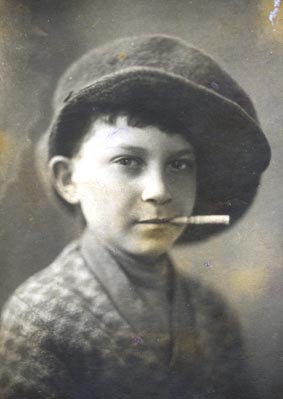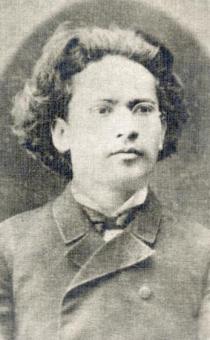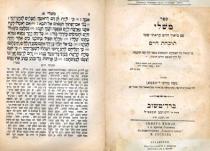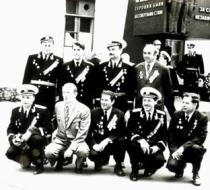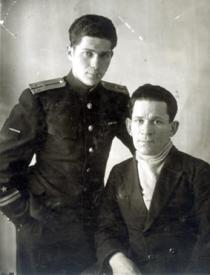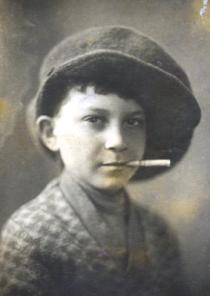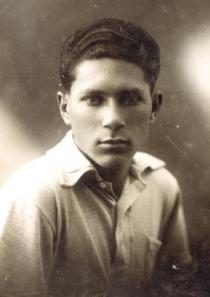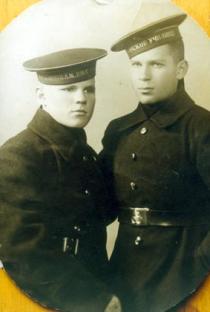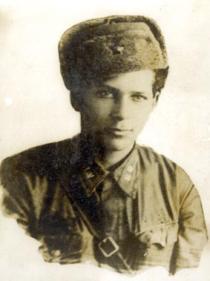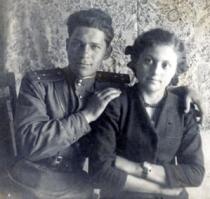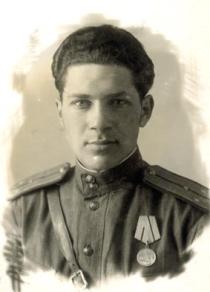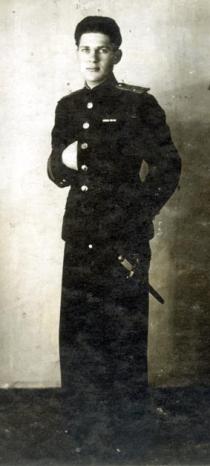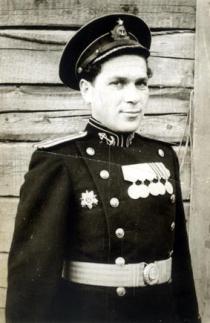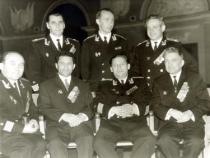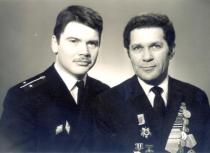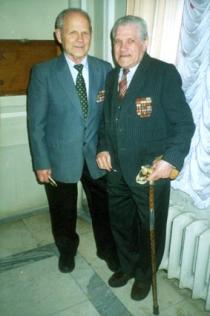This photograph shows me at the age of 5 or 6. My uncle, senior brother of my father Samuil took it. When I arrived from Kerch to Leningrad together with my parents, he said ‘I’ll take a photograph!’ He put a cap on me and gave me a cigarette. I guess it happened in 1929 or 1930. I was a student of the 1st grade, i.e. I was little.
Samuil was called up for military service in tsatist army, where he was an ensign (a junior lieutenant). To tell the truth, he became an officer in haste - just like me when I became a lieutenant two months after the war burst out.
After the end of the war he was not subjected to repression [at that time Soviet authorities annihilated officers of the tsarist army], because he did not fight against Red Army. But as he was a tsarist army officer, he was deprived of some rights: in 1920s he could not find work and managed to get fixed up in a job of photographer in a photostudio.
My paternal grandfather (Boris Moisseevich, a poet) had 6 children: 4 brothers and 2 sisters. All of them lived and died in Leningrad.
Samuil died here in Leningrad in 1970s (it seems to me that it happened in 1973). His wife Maria (I do not remember her patronymic, for me she was aunt Marussya) was a Jewess, a doctor, a major of medical service, chief of a hospital train.
Their daughter Adelaida was born in 1922. She died in Leningrad two years ago, in 2002. She lived not far from here. Her husband Andrey Kossenko, a Ukrainian, was a radiologist. She also was a radiologist - and they got acquainted. He died a bit before his wife also here in Leningrad. They had a daughter.
Their second brother was my father.
The third brother Emanuil (we called him Manila) was born in 1901. I think I am right, because my father was born in 1899, and Emanuil was the third son. He was a splendid chess player: he managed to trim Botvinnik at chess several times, when Botvinnik was young. [Botvinnik was a well known USSR world champion in chess.] A journal named Chess Bulletin remained intact somewhere at ours, where there was a series of photos named 'Emanuil Lesman's Display of Multi-Board Chess in Berlin'.
He was acquainted with Kapablanka. [Khose Raul Kapablanka, a Cuban, was one of the world champions in chess.] He also knew Lasker and Reshevsky (American grand masters and champions). Uncle Manila worked at the Electrossila factory. [Electrossila factory was one of the largest electrotechnical enterprises in the USSR.]
He died here, in Leningrad, from starvation, during the siege. I was the last one from our family to see him, because all the family members had been evacuated, but him: he was going to leave Leningrad together with Electrossila employees a bit later.
I used to visit him in his apartment in Michurinskaya Street. Last time I brought him crackers and 2 packs of tobacco (I received it as I was a cadet). I said 'Uncle, I am leaving tomorrow.' I remember him together with his neighbour sitting on the stove, trying to get warm. They had all their clothes on, because it was terribly cold in the apartment.
It was in December, I was evacuated in December 1941, and he had to leave a couple of days later together with the factory staff. And as I got to know from documents, he died literally several days after our last meeting.
The fourth was Vitalia Lesman, a great architect: there are a lot of buildings constructed according to her project in Sverdlovsk and one or two buildings in Leningrad. [Sverdlovsk is a large industrial center in Urals, nowadays Ekaterinburg.]
The fifth was Deborah Lesman. She was a pianist. At first she lived in Leningrad (Petrograd), during the war she was in evacuation (I do not remember where). Later she lived somewhere else, and returned to Leningrad after a ten-year period. She died in Leningrad.
They both were single. They died in 1970s.
And the last son was Isaac - uncle Isya. He was a head of some department in the tram depot named after Leonov. He survived during the siege of Leningrad and died from heart attack in 1970s. He lived in Vassilievsky Island. [Vassilievsky Island is one of the central islands in St. Petersburg.]
One day he left his apartment to buy some bread and died in the street. His wife Valentina Vostryak, a Jewess died in 2002. Their son Vladimir died at the age of 50 from the serious illness: disseminated sclerosis.
At present his wife Barbara lives in America together with her second husband, and their son Sasha lives in Switzerland.
